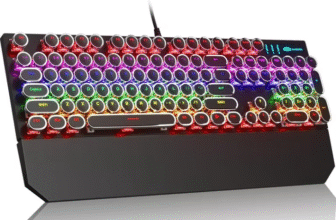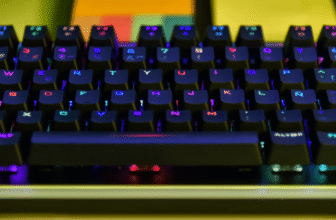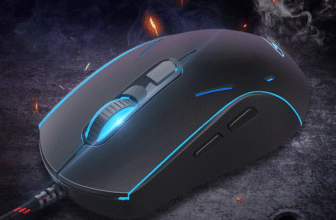- What Are the Benefits of a Mechanical Keyboard?
- 1. Superior Durability and Long-Term Value
- 2. An Enhanced Typing Experience
- 3. Better Performance for Gaming and Productivity
- 4. Unmatched Customization and Repairability
- 5. Improved Ergonomics and Comfort
- What Are the Disadvantages of a Mechanical Keyboard?
- Mechanical Keyboard vs. Membrane Keyboard: Quick Comparison
- So, Is It Worth Buying a Mechanical Keyboard?
- Conclusion
- Frequently Asked Questions (FAQ)
If you spend a lot of time typing, you might be wondering if that standard, mushy keyboard on your desk is holding you back. For a growing number of typists, gamers, and professionals, the answer is a resounding yes. But why use a mechanical keyboard when your current one works just fine?
The simple answer is that mechanical keyboards offer a superior experience in nearly every way, combining longer durability, a more consistent and satisfying typing feel, and extensive customization options. They are a significant upgrade over the common membrane keyboards, translating into measurable benefits in performance, comfort, and even long-term value.
However, a mechanical keyboard isn’t for everyone. They come with tradeoffs in cost and noise that you need to consider. This guide will break down all the benefits of a mechanical keyboard and its potential drawbacks, so you can confidently decide if it’s a worthwhile investment for you.
💰Save More with Our Discounts & Coupons!
What Are the Benefits of a Mechanical Keyboard?

The core advantages of a mechanical keyboard all stem from its fundamental design: each key has its own individual mechanical switch. This is a major difference from typical membrane keyboards that use a single sheet of rubber domes. This design leads to several key benefits.
1. Superior Durability and Long-Term Value
One of the most compelling mechanical keyboard advantages is its exceptional durability. Mechanical switches are typically rated to withstand 50 to 100 million keystrokes. In stark contrast, the rubber domes in a membrane keyboard are often rated for only 5 to 10 million. This means a quality mechanical keyboard can last for many years—even a decade or more—making it a better long-term investment despite the higher initial cost.
2. An Enhanced Typing Experience
The defining feature of typing with a mechanical keyboard is the superior tactile feedback. The precise action of the individual switches provides a consistent and satisfying feel that a membrane keyboard’s mushy domes can’t match. This precise feedback allows typists to know the exact moment a key is registered, which can lead to:
- Improved Accuracy: Consistent actuation reduces typos and missed keys.
- Increased Speed: Confident keystrokes and better rhythm can translate to faster typing.
- Reduced Fatigue: Because you don’t have to press keys down as hard (“bottom out”), you experience less finger strain over long sessions.
3. Better Performance for Gaming and Productivity
For serious gamers, the benefits are undeniable. Low-travel “speed” switches offer near-instant actuation times, providing a competitive edge. Features like n-key rollover (NKRO) ensure every single keypress is registered, even when multiple keys are pressed at once—a common issue called “ghosting” on cheaper membrane boards. For professionals, the improvements in accuracy and comfort from a mechanical keyboard enhance focus and efficiency during long workdays.
4. Unmatched Customization and Repairability
A mechanical keyboard is more of a platform than a sealed product. Many modern boards are “hot-swappable,” meaning you can easily pull out the switches and replace them without any soldering. This opens up a world of customization:
- Switch Choice: Experiment with different switch types (linear, tactile, or clicky) to perfectly tune the keyboard’s feel.
- Keycaps: Swap out keycaps to change the material, profile, and look of your board.
- Repairs: If a switch fails, you can simply replace it instead of throwing away the entire keyboard.
5. Improved Ergonomics and Comfort
Mechanical keyboards can be configured for better ergonomics, which helps reduce physical discomfort during extended use. By selecting switches with lower force requirements or choosing an ergonomic layout (like a split design), users can optimize their hand and wrist posture. This can be a crucial factor in preventing repetitive strain injuries (RSIs).
💰Save More with Our Discounts & Coupons!
What Are the Disadvantages of a Mechanical Keyboard?

While the benefits are clear, there are important tradeoffs to consider before buying a mechanical keyboard.
- Higher Upfront Cost: Mechanical keyboards are almost always more expensive than membrane alternatives. The precision engineering and higher-quality materials come at a price, making them a more considered purchase.
- They Can Be Loud: The noise is a common concern. While many people love the satisfying sound, “clicky” switches can be disruptive in a shared office or quiet home environment. However, quieter options like silent tactile and linear switches are widely available.
- Heavier and Less Portable: Due to their robust construction and metal components, most mechanical keyboards are heavier and bulkier than membrane boards, making them less ideal for frequent travel.
- A Short Learning Curve: The different feel and potentially higher key profile may require a brief adaptation period as your muscle memory adjusts.
Mechanical Keyboard vs. Membrane Keyboard: Quick Comparison
| Feature | Mechanical Keyboard | Membrane Keyboard |
|---|---|---|
| Typing Feel | Precise, consistent, and satisfying feedback. | Soft, mushy, and often inconsistent. |
| Durability | High (lifespan of 50-100 million keystrokes). | Low (lifespan of 5-10 million keystrokes). |
| Performance | Faster, more accurate, with N-key rollover. | Slower, less precise, prone to ghosting. |
| Customization | High (swappable switches, keycaps, etc.). | Very limited or none. |
| Noise Level | Can be loud, but quiet options exist. | Naturally quiet. |
| Cost | Higher initial investment. | Budget-friendly. |
💰Save More with Our Discounts & Coupons!
So, Is It Worth Buying a Mechanical Keyboard?

The answer depends entirely on your needs and priorities. After weighing the pros and cons, here’s who benefits most from making the switch.
You should definitely use a mechanical keyboard if:
- You Type for Hours a Day: Writers, programmers, analysts, and other professionals will feel a dramatic improvement in comfort and efficiency.
- You Are a Serious Gamer: The responsiveness, precision, and durability are essential for competitive gaming.
- You Value Durability and a “Buy It for Life” Mentality: A mechanical keyboard is a long-lasting tool that won’t need to be replaced every couple of years.
- You Love to Tinker and Personalize Your Gear: The customization possibilities are virtually endless.
You might stick with a membrane keyboard if:
- You are on a very tight budget.
- You require a keyboard that is absolutely silent.
- You need a lightweight keyboard for frequent travel.
Conclusion
A mechanical keyboard is far more than just a retro trend; it is a superior tool designed for durability, performance, and user satisfaction. The tactile feedback enhances every keystroke, the robust build quality ensures a long lifespan, and the deep customization allows you to create an experience that is uniquely yours.
While the higher cost and potential noise are valid considerations, the long-term benefits for anyone who relies on a keyboard for work or play make a mechanical keyboard an exceptionally worthwhile investment.
Frequently Asked Questions (FAQ)
Professional gamers and typists prefer mechanical keyboards for their speed, accuracy, and reliability. Switches with faster actuation allow for quicker reactions in-game, and the consistent feedback ensures precise inputs during high-stakes competition or intensive work sessions. Their immense durability also means the keyboard can withstand millions of keystrokes without failing.
Yes, many users report typing faster and more accurately on a mechanical keyboard. The distinct tactile feedback from the switches helps you develop a better typing rhythm and confirms each keystroke, reducing errors and increasing confidence, which can lead to a natural increase in speed over time.
With proper care, a mechanical keyboard can last for 10-20 years. The individual switches are typically rated for 50-100 million presses, far surpassing the lifespan of membrane keyboards, which may fail after just a few million. This longevity makes them a cost-effective choice in the long run.






